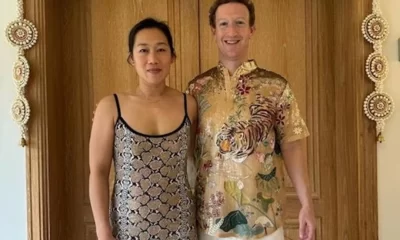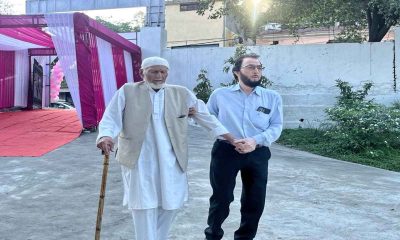Latest world news
Free the nipple: Meta to lift ban from breast images on Facebook, Instagram
The board in its recommendations said that the old policy is based on a binary view of gender and a distinction between male and female bodies.

Reportedly, Meta’s independent oversight board has finally decided to lift its strict no-nipple rule. Following a decade long Free The Nipple campaign, now Instagram and Facebook has strike off ban on bare breasts photos. The board suggested to take down the old policy so that it is governed by clear criteria that respect international human rights standards.
The oversight board, which is composed of academics, journalists and politicians advised the tech firm to change its adult nudity and sexual activity community standard on January 17. According to The Guardian, the recommendations made by the board are binding and Meta is most likely to follow them.
If reports are to be believed then, the board in its recommendations said that the old policy is based on a binary view of gender and a distinction between male and female bodies. This does not only creates a gender bias but also makes rules about baring nipples unclear for for the ones not identify as women.
The recommendations further states that the old policy hinders inclusivity on the platforms, especially for intersex, women, transgenders, and non-binary people. Moreover, the change in Meta’s strict policy will come after, the organization took down two Instagram posts featuring transgender and non-binary people with bare chests.
For the unversed, Meta’s strict nudity policy has been a part of intense debate for a decade now over its strict guidelines in cutting the exposure of women’s nipples. The policy has often come in the way of breastfeeding women who had to censure their content. Free The Nipple movement began in 2000 in an attempt to de-sexualise the image of breasts. The act went mainstream in 2012 after Facebook took down clips from the actor/director Lina Esco’s documentary Free the Nipple.
The move was heavily criticised and several protests had broken out at Facebook headquarters, demanding the right for women to bare their breasts on social media with consent. However, CEO Mark Zuckerburg tried to justified the act in 2018 saying that it is easier to build an AI system to detect a nipple than to decide what an hate speech is.
Hansika Motwani-Sohail Kathuria wedding to be streamed on OTT, here’s how to watch
At 115, Spanish granny Branyas Morera is world’s oldest; never visited a hospital
Latest world news
World Earth Day 2024: Google Doodle showcases aerial view of planet’s natural beauty
Google celebrated Earth Day 2024 with a special doodle featuring an aerial view of our planet’s biodiversity.

Google shared a doodle today to celebrate World Earth Day 2024, which showcased aerial photos of the planet’s biodiversity and natural beauty. Google reminded us of the importance of protecting planet earth for future generations with the help of this doodle.
The Google letters depict specific locations across the globe where people, communities, and governments work every day to help protect the planet’s natural beauty, biodiversity, and resources, according to the explanation of the annual Earth Day 2024 doodle on their website.
It said, these examples remind us that there’s much more to do to address the climate crisis and biodiversity loss, but also offer the promise of hope and optimism.
The islands of Turks and Caicos are represented by the letter “G.” The islands’ conservation efforts are concentrated on protecting important regions for biodiversity and addressing persistent environmental problems.
The largest reef in the southern Gulf of Mexico and a UNESCO biosphere reserve, Scorpion Reef National Park, is represented by the letter “O” in the Mexican flag.
The letter “O” features Iceland’s Vatnajokull National Park, which was designated as a national park in 2008 following decades of advocacy. The ecology within and surrounding the biggest glacier in Europe is safeguarded by this UNESCO World Heritage Site.
The letter “G” has the Jau National Park in Brazil on it. It is a UNESCO World Heritage Site and one of the biggest forest reserves in South America.
The Great Green Wall of Nigeria is represented by the letter “L,” and the Pilbara Islands Nature Reserves of Australia are represented by the letter “E.”
Meanwhile, Earth Day is a worldwide event that promotes protection of the environment every year. April 22 serves as a reminder of the importance of conservation efforts and sustainable practices to guarantee a healthier world and a brighter future.
The occasion inspires people across the world to come together and take action to protect the environment, strengthening our bonds with nature and promoting good change.
Latest world news
Bigg Boss 14 contestant Rahul Vaidya struggles walking in knee deep water, compares Dubai rains with Mumbai floods
Singer and TV personality Rahul Vaidya was recently stranded in the Dubai rains.

Rahul Vaidya, who was in Dubai ahead of his show which was scheduled to take place today, left the country due to heavy rains and reached Kolkata. The artist shared on social media his encounters in the UAE city, including challenges like walking through knee-deep water. Rahul provided an update regarding the heavy rainfall in Dubai on his Instagram profile.
The Bigg Boss 14 contestant revealed that he was in Kolkata and prepared to do an evening performance. Recalling the terrifying period he went through, Vaidya said there was a lot of confusion and panic in Dubai. The situation was similar to that when heavy floods hit Mumbai in 2005.
Vaiday also posted seval other images and videos of cars that were underwater and flooded roadways. The Bigg Boss 14 contestant, who shared his ordeal, claimed that even though it had just rained for two hours, the situation was dire.
In one of the video, which went viral he can be seen struggling in walking in knee-deep water. He can be also seen holding his sneakers in one hand and with other hand he was seen managing other things.
This is the result of the two hours of rain that it had, he can be heard saying in the video. Vidya also said he dosen’t believe Dubai is accustomed to a lot of rain. Everything had stopped working, he remarked.
After taking part in the first season of the singing reality show Indian Idol, Rahul Vaidya gained widespread recognition. In addition to Bigg Boss, he took part in Khatron Ke Khiladi 11.
Meanwhile, heavy rains that triggered flooding in the UAE and Bahrain, which left 18 people dead in Oman on Sunday and Monday, have paralyzed the financial hub of the Middle East, Dubai.
A lot of incoming flights were diverted from Dubai’s international airport because of the rain. At 7:26 p.m., the busiest airport in the world for foreign visitors stopped accepting new arrivals; a gradual resumption was announced for more than two hours later.
Images of planes navigating flooded tarmacs are making the rounds on social media.
According to pictures shared on social media, the flagship malls Dubai Mall and Mall of the Emirates both experienced heavy floods, while at least one Dubai Metro station had water up to the ankles.
There were several road collapses, severe flooding in residential areas, and numerous reports of leaks from windows, doors, and roofs.
Due to the unfavourable weather, schools around the United Arab Emirates were forced to close, and as more storms are predicted, the closures are anticipated to last until Wednesday. The government of Dubai allowed its staff to work remotely till this Wednesday.
Latest world news
Dubai sky turns green during storm in UAE, video goes viral
The UAE witnessed record-breaking rainfall on Tuesday and the National Centre of Meteorology recorded 254 mm of rainfall in less than 24 hrs in the Khatm Al Shakla area in Al Ain.

1 person was killed in UAE as it witnessed heavy rainfall on Tuesday, stranding commuters, flooding roads, disrupting trains and flights and resulting in water leakage from mall ceilings. The UAE witnessed record-breaking rainfall on Tuesday and the National Centre of Meteorology recorded 254 mm of rainfall in less than 24 hrs in the Khatm Al Shakla area in Al Ain. It is being said that the rainfall was the highest documented since the start of data collection in 1949.
The heavy rainfall in UAE came days after a similar situation in neighbouring Oman, where 13 people were killed in flash floods. Many parts of Oman saw torrential rains, which caused students to be trapped in buses and swept away motorists and trapped people in their homes.
Videos from Dubai circulating on social media showed widespread waterlogging on roads in Abu Dhabi, Dubai and other important cities. This left daily commuters in cars and other vehicles struggling to get back home. Dubai metro station too was seen flooded and closed.
One such video circulating on social media shows the aerial view of the city of Dubai from the top of a building. In the video the stormy winds are seen blowing over the city of Dubai. As the storm intensifies the Dubai sky turns green and ultimately gets covered by heavy rainfall. The video has gone viral on social media with more than 1.1 million views.
Another video showed water leakage from the ceilings of shopping malls, flooding the floors and destroying goods. A video which was shot in the famous Mall of the Emirates, showed pieces of ceiling falling as the rainwater gushed inside. Videos from many outlets of the Deira City Centre mall chain showed escalators being rendered unusable. Majid Al Futtaim, the company which owns the Mall of Emirates, said that the shopping complexes have been kept open and the customers are being sent away from the flooded areas.
-

 Cricket news19 hours ago
Cricket news19 hours agoTelugu superstar Mahesh Babu meets SRH captain Pat Cummins, says it is an absolute honour
-
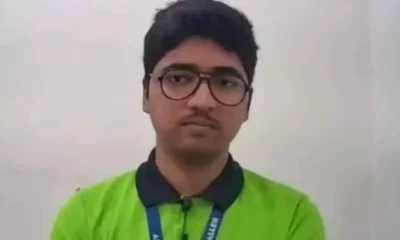
 Education24 hours ago
Education24 hours agoFarmer’s son Nilkrishna Gajare Nirmalkumar from Maharashtra scores 100 NTA score in IIT-JEE Mains 2024
-

 Entertainment22 hours ago
Entertainment22 hours agoAamir Khan to begin shooting in Delhi for Sitaare Zameen Par next month
-
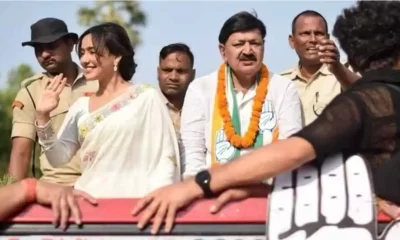
 2024 Lok Sabha Elections22 hours ago
2024 Lok Sabha Elections22 hours agoBollywood actor Neha Sharma campaigns for her father Ajit Sharma in Bhagalpur, Bihar
-

 Cricket news20 hours ago
Cricket news20 hours agoAB De Villiers criticizes RCB’s decision to let go Yuzvendra Chahal, says it was a hearbreaking moment
-
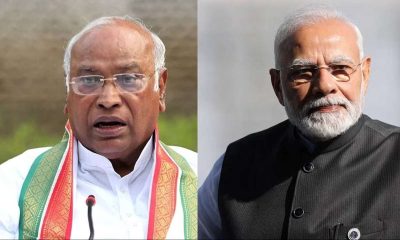
 2024 Lok Sabha Elections19 hours ago
2024 Lok Sabha Elections19 hours agoMallikarjun Kharge writes to PM Modi seeks time to explain Congress’s Nyay Patra
-
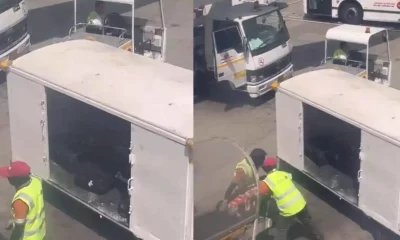
 Trending18 hours ago
Trending18 hours agoSocial media user shares video of Air India ground staff throwing expensive musical instruments, video goes viral
-
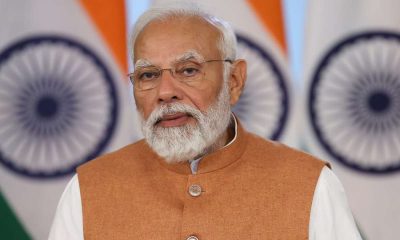
 2024 Lok Sabha Elections2 hours ago
2024 Lok Sabha Elections2 hours agoPM Modi calls for high voter turnout in second phase of Lok Sabha elections 2024, says your vote is your voice



